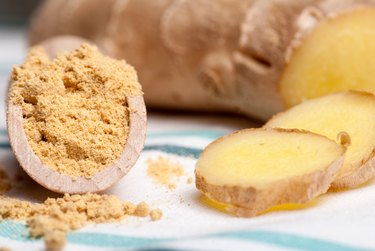
The underground rhizome ginger has been used for thousands of years in various Eastern medical traditions. Best known for quelling nausea and vomiting, it also has strong anti-inflammatory properties, making it a popular treatment for conditions like arthritis. You can eat the actual plant or use supplements, commonly made from the dried root. While the Food and Drug Administration lists ginger as a food and supplement generally recognized as safe, ginger does carry the potential for some negative effects.
Side Effects of Ingestion
Video of the Day
Side effects from taking ginger usually are rare, reports the University of Maryland Medical Center. If it is taken in excess, however, possible side effects include heartburn, diarrhea, mouth irritation and stomach upset. Taking ginger in supplement form rather than consuming it as a food might reduce the likelihood of these effects. Drugs.com, which compiles information on drugs and supplements from medical databases, says reports of irregular heartbeat and allergic reaction have been reported.
Video of the Day
Ginger and Bleeding
Memorial Sloan Kettering Cancer Center reports that ginger has exhibited blood-thinning properties, meaning it increases the amount of time it takes blood to clot. You should not use ginger if you have bleeding disorders. Using it at the same time as blood-thinning medications could increase the risk of bleeding and bruising. The center notes a case study in which an elderly women using anticoagulant medications long term concurrently with ginger supplements experienced spontaneous nose bleeds and an elevated INR, a measurement indicating blood-clotting time. Her condition stabilized after she stopped taking ginger. You should discontinue ginger use at least several days before a planned surgery; consult for your doctor for a specific time frame. If you find yourself faced with an unplanned surgery, be sure to alert the medical staff that you have been using ginger.
Other Considerations
Do not use ginger if you have gallstones. It has demonstrated blood-sugar lowering properties, and using ginger at the same time as insulin or other medications used to lower blood sugar could cause hypoglycemia.
Dosage in Children and Adults
Do not give ginger to children under 2 years old; consult with your pediatrician for proper use in children. The University of Maryland Medical Center recommends giving children about one-third of the adult dosage. It cautions adults against taking more than 4,000 mg daily.